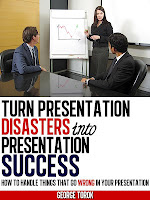Power Presentations Tips 23:Begin with more confidenceMany presenters have confessed to me that if they can survive through the first few minutes of their presentation - then they will feel alright. It's just the beginning that they dread.
That's a risky way to approach your presentation because the opening is so important. Decisions are being made about you and your message in those opening seconds.
How can you feel and look more confident from your first word?
Your IntroductionSit or stand proud while you are being introduced. While the audience is listening to your introduction - which should briefly confirm your qualifications for this topic - your audience will study you. They will be checking to see if the picture matches the words. This is not the time to feign humility or look nervous. Look proud while your achievements are listed.
You might not always have a formal introduction. However any introduction should be used to your benefit. Caution: Look proud and confident but not pompous and arrogant.
Start SlowlyStart your presentation very slowly. Speak slower than normal. You might feel a bit awkward but with practice you will get it right. There are three reasons to start slowly:
1. This will help you stay calm. Speaking slowly will force you to breathe slower and that calms you.
2. Your audience will have a better chance to tune into your voice. This is especially relevant when they don't know you and/or you have an accent that sounds different from their norm.
3. Speaking slowly will deepen your voice. That makes it easier to hear and conveys more confidence.
Say something positiveIf you start with a positive statement your audience will go with you. If you are feeling nervous then this is the one time that you are allowed to tell a lie. That lie is, "I'm happy to be here today." You might not feel that way at the time but if you state it with enough conviction you might persuade your audience and yourself of that constructive white lie.
George Torok
PS: tell me how this tip helps you.-------------------------
Feedback
"(Tips) Are terrific, are really what I need, Thanks a lot."
Shajar Mohammed
ITS International Turnkey System
Khartoum, Sudan---------------------
Register for your free Power Presentation Tips hereView videos on Presentation skillsArrange for Presentation Skill training.
Executive Speech Coach, Business presentation tips from George Torok, the Speech Coach for Executives.




